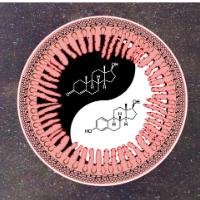
Credit: Yu et al
Colon cancers have a higher incidence in males, which is in part related to much higher androgen levels in males compared to females. Scientists have now discovered a link between androgens and stem cells that could contribute to colon cancer. Some cancers in the intestine are thought to arise from intestinal epithelial stem cells, which are needed for normal tissue maintenance and regeneration, but which can give rise to cancers when they grow improperly. In research recently published in Stem Cell Reports, Jingxin Li, Dawei Chen and colleagues found that androgen levels can regulate intestinal stem cell proliferation, a new potential link between androgen levels and colon cancer. By tuning androgen levels in mice with genetic or pharmacological tools, the researchers found that high androgen levels cause intestinal stem cells to divide more than usual and at the same time generated less mature epithelial cells, characteristic of changes that can lead to tumor formation. Interestingly, findings show that this effect was not direct but involved the surrounding niche cells, a population of cells that regulate intestinal stem cell growth and function. While important follow up research is needed, these findings may have implications for treating or preventing colon cancers through androgen regulation.
###
About Stem Cell Reports
Stem Cell Reports, is an open access forum communicating basic discoveries in stem cell research, in addition to translational and clinical studies. In addition to full-length articles, Stem Cell Reports, features shorter, single-point manuscripts that report original research with conceptual or practical advances of broad interest to stem cell biologists and clinicians. Stem Cell Reports, was launched in June 2013 and is published for the International Society for Stem Cell Research (ISSCR) by Cell Press.
About the International Society for Stem Cell Research
With nearly 4,000 members from more than 60 countries, the International Society for Stem Cell Research is the preeminent global, cross-disciplinary, science-based organization dedicated to stem cell research and its translation to the clinic. The ISSCR mission is to promote excellence in stem cell science and applications to human health. Additional information about stem cell science is available at A Closer Look at Stem Cells, an initiative of the Society to inform the public about stem cell research and its potential to improve human health.
Media Contact
Kym Kilbourne (ISSCR)
[email protected]




